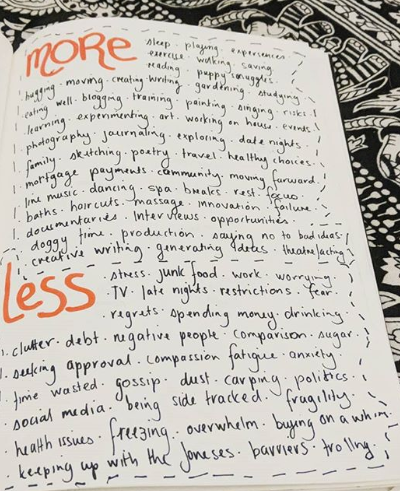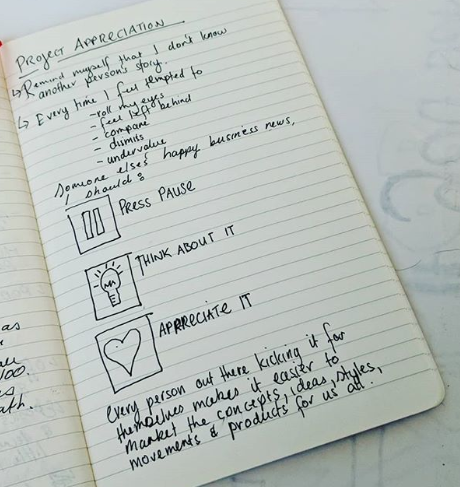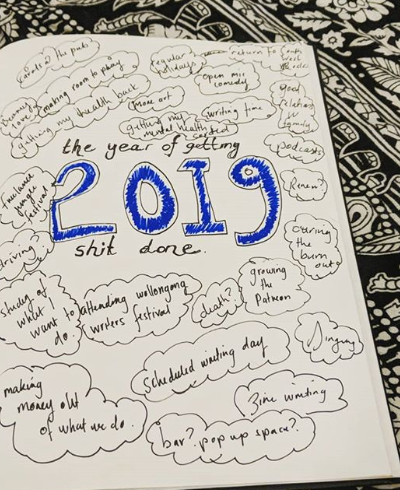Journalling is something I do every night before I go to bed. I find it helps me and with my freelance business. A lot of people freak out at the thought of a regular journalling practice. Maybe you get into pages and pages and then stop for a period of time. Maybe you forget a lot. Or you feel like you have nothing to say.
Here’s how journalling works for me and myself and my freelance business. And how you might be able to use it too
First tip is always the simplest one- find the tools that you like and stick to them.
Structured journal versus unstructured journal
Journals are so in vogue that they are hanging off Facebook, filled with promise and wonder. And yes, I bought quite a few of them. Too many of them. They now stand as a symbol of intimidation more than anything.
What I found was I resented the homework. But you might enjoy the structure from exercises, writing prompts and ideas. They can help you give gratitude and all sorts of stuff.
They made me pancake on the floor and get more frustrated. I have enough bloody people telling me what to do. I need a break from it. I’m a rebel. <insert other excuses here>
Oh, and they can be pricey. OK, I am over that now. Let’s continue.
My solution: I use unlined art books or inspirational journals with quotes or art that don’t ask me to do anything. A5 art diaries are great for this as they have nice paper, you can write and draw where you want. They are about $6 a pop (or cheaper), you can decorate the cover the way you like. And they fit in most bags, shelves and bring a creative vibe.
Writing implements: If you do like mind mapping or drawing, Posca pens are awesome, as are Artline fine liners. There are also 100 amazing pens in this list. Knock yourself out. I have a collection of each beside the bed, in the lounge and at my desk in old scented candle bottles.
You say ‘obsessive’. I say, ‘be prepared’.

The actual journalling parts
Journalling should be a reflective practice for your freelance business. The idea is that you capture feelings, ideas and moments so that you can get perspective. They also stand as a living log for later on.
To tap into reflective practice, it’s important to write by hand so that you get the chance to think. Plus, you need to take the good with the bad. Our keyboards allow us to edit how we present ourselves. Sometimes, removing that barrier and seeing it in free form is what we need most.
I journal each night answering these key questions because they work for me:
- 3 challenges I face
- 3 things I am grateful for
- 3 things I did well that day
Why challenges?
Writing down my challenges helps in two ways.
First, it gets them out there on the paper. The art of writing helps me reflect on the situation. It also means I have a safe place to put stress, fatigue, negative mentions and fear. For a person with anxiety such as myself, this is incredibly important.
Secondly, when we are dealing with the challenge at the time, it takes up a lot of space and can seem huge. Yet when you go back to look at what you have been through, you can see the change in your life and attitude.
Perspective comes too. You see the things haven’t been as harmful, frightening or impacting as you may have thought at the time. Or that if they have, you’ve still survived. You may even see the positive in the pain.
This helps give you more faith in your ability to govern your freelance business.
It’s like having a rear-view mirror on your life. It teaches you to have a healthier relationship with challenges. And it fosters more resilience in the process.
Journalling helps you spot unhelpful rumination on particular situations. It aids as spotting patterns in your own choices as well to break bad habits or when you get in your own way.
And yes, it identifies people and situations that are full of drama that you may want to rethink as well!

Practicing gratitude
You’ve probably heard a bucket load of stuff about how in vogue practicing gratitude works. From Buddhists to business mentors, there’s a lot of love for being grateful.
It’s not coming out of nowhere. I was sceptical when I started but it works. It helps remind you that even in a world where you’re often putting out fires, there are some things you never have to worry about. It teaches you to recognise healthy connections and relationships, positive clients and opportunities.
You also begin to realise there is more to the world than your problems, your needs and your success, too. Your freelance business becomes less all-compassing.
Being grateful doesn’t have to be massive to be effective. We live in a strange society where we often only hear from someone when there is a problem. We don’t like this, but we don’t do much to change it.
Yet once you start recognising people and the support they give, it does change. You start looking for the good. They might follow your lead. They’ll feel better too. If they pick up the habit, it comes back.
Win-win.
When bad stuff happens, it influences you to look for the positive as well. if you’ve trained your brain to see positive connections, it seeks them out. I cannot tell you how helpful that is when things aren’t going well.
It’s not corny or cheesy to be grateful and thankful. It’s a skill acquired through vulnerability. Vulnerability (despite the press) is a strength. The more you give thanks for others and opportunities, the stronger you’ll feel.
Plus, who doesn’t like a nice thing said about them? It’s great for building freelance relationships too.
Do that day well
Admiring what you’ve done well that day has a few pay-offs.
If you’ve had a wonderful day with your freelance business, it’s a way of celebrating and internalising that sense of joy and achievement. If it’s been a stinker, finding the 3 things you do well can make you feel less angry, defeated or hopeless.
It shifts your perspective.
Day reflection is a great technique if you are under a lot of stress. Or if have a physical or mental health condition or are working while grieving loss.
It doesn’t have to be amazing.
Sometimes, the best we can hope for is half an hour of focussed work. Or resisting the urge to cancel that meeting. Or getting in the shower. Instead of blaming and shaming ourselves, those 3 things are small stepping stones to the positive.
Having a record of the things you have done helps map the progress. In a world where we’re governed by TO DO lists and looking forward, it grounds us. It gives us a moment to be present and see the moves we’ve made. It’s about pulling them out of the blur of a busy day and giving them recognition.
Journalling about your freelance business is valuable
Freelancing is also a thankless job. If you don’t reflect on what you got done and how well you did it, the dog probably won’t tell you. The clients often don’t. We rarely have time.
This is about making a process and space for that to happen.
It also means we can reflect on ourselves and grow as our business does. Nobody gets it right all the time, first time. In fact, the moment you think you’ve got it all figured out is usually the moment the cards start to shake. Logging the journey helps to ground us in a busy world. Feel free to follow me on Instagram to see it in action. Sing out and we can compare journals!

